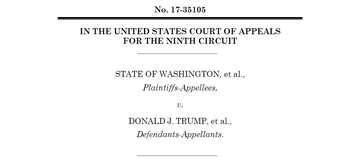When President Trump temporarily banned travel from seven Muslim-majority nations to the US two weeks ago, the reaction from the tech industry was instant - some scrambled to return employees, while others denounced the executive order.
Criticism continued to flow in last week, but now the industry has taken a more substantial step - 97 companies, most of which are tech firms, have filed an amicus brief in opposition to the ban.
Silicon rally
“Immigrants make many of the nation’s greatest discoveries, and create some of the country’s most innovative and iconic companies,” the brief says.
“America has long recognized the importance of protecting ourselves against those who would do us harm.
”But it has done so while maintaining our fundamental commitment to welcoming immigrants—through increased background checks and other controls on people seeking to enter our country.”
The plantiffs include Google, Apple, Intel, Facebook, Cloudera, Cloudflare, eBay, LinkedIn, Microsoft, Netflix, Spotify, Twitter and Uber. Notably absent were IBM and Oracle, whose CEOs have joined Trump’s advisory board.
Amazon was not present on the list, but the company partnered with Expedia last week to launch its own legal challenge.
The brief, released Sunday, said that the ban “inflicts significant harm on American business, innovation, and growth as a result. The Order makes it more difficult and expensive for U.S. companies to recruit, hire, and retain some of the world’s best employees. It disrupts ongoing business operations. And it threatens companies’ ability to attract talent, business, and investment to the United States.”
It continued: “Immigrants or their children founded more than 200 of the companies on the Fortune 500 list, including Apple, Kraft, Ford, General Electric, AT&T, Google, McDonald’s, Boeing, and Disney. Collectively, these companies generate annual revenue of $4.2 trillion, and employ millions of Americans.”
The ban has been temporarily suspended at the time of writing, after a federal judge argued that it was unconstitutional, and the US federal appeals court rejected the Trump administration’s request to reinstate it.
But tech companies are also concerned about further immigration changes, particularly to the H1-B visa scheme. Trump is reportedly preparing to overhaul the program, making it far harder for tech firms to hire skilled workers from abroad. This would likely require an act of Congress and could not be signed into action by the President himself.
The two advisors thought to be the architects behind the Trump travel ban are Stephen Miller and Steve Bannon. Miller previously worked for Senator Jeff Sessions, a frequent critic of H1-B visas, while Bannon was widely criticized for saying in a 2015 interview: “When two-thirds or three-quarters of the CEOs in Silicon Valley are from South Asia or from Asia, I think… A country is more than an economy. We’re a civic society.”

